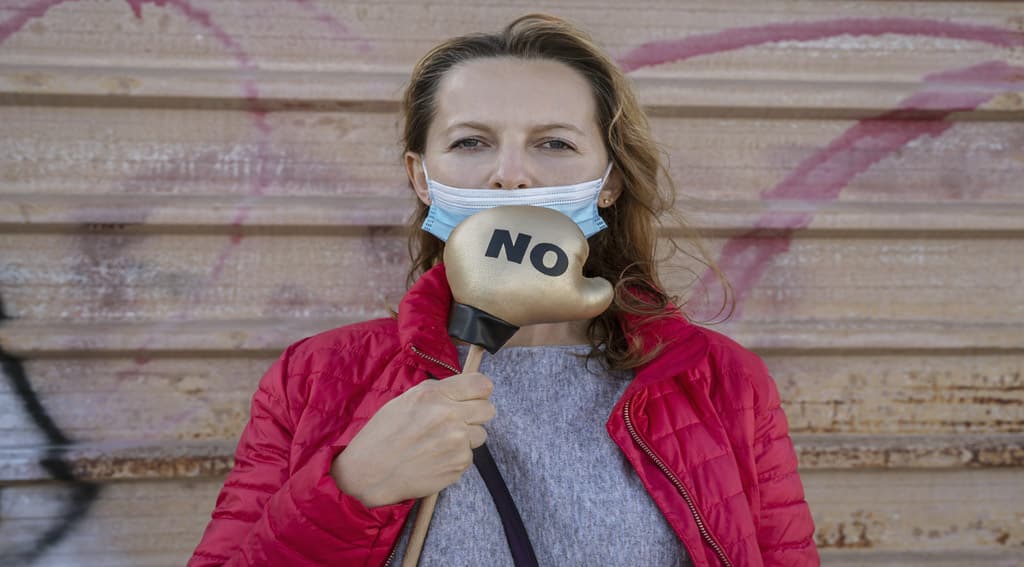De-Escalating COVID Mask-Related Conflict and COVID Mask Aggression
28 November 2020
With regards to COVID mask aggression, we see it on social media almost every day: Another viral video of a customer hashing it out with an employee or bystander, simply over the issue of wearing a mask.
In the U.S., there’s even been one reported instance of a COVID-19 mask-related murder.
Without a coronavirus vaccine, mask-wearing is one of the most effective ways to protect yourself and others from contracting the illness.
So why has this become such a contentious issue? And what can you do to limit COVID mask aggression in your own workplace?
Understanding the Problem
Psychology Today puts it succinctly by describing face masks as a “visible marker” of a bitter political divide.
Those with left-leaning ideologies tend to see the situation more direly, while those on the right tend to be sceptical of how the media reports on the virus every day, despite warnings and advisories from top scientists.
Similarly, many perceive masks as a sign of political allegiance. If world leaders don’t set an example by wearing masks in public, their supporters might feel like they shouldn’t have to wear a mask, either.
The same goes for the other side of the aisle: Mask-wearers might be verbally or even physically assaulted if their mask implies support for the political “opposition.”
More than that, the face mask has become an emblem of a broader political debate: Whether to protect the economy from devastation or to put the wellbeing of others above profit.
Some even see mask requirements as an infringement on their personal liberties. And both sides are guilty of fanning the flames. “Anti-maskers” are deemed selfish and misinformed,” while mask-wearers are shamed for buying into “fear-mongering.”
Social media plays a key role in advancing that rhetoric. When we share a viral post that we agree with, we spread that message to new audiences — regardless of whether it’s actually true.
The result? An echo chamber of confirmation bias. The more our news feeds get clogged with misinformation, the less room for accurate information to make its way past the algorithms.
But that’s not to say all hope is lost. Here are the best ways to minimize COVID-related violence in your workplace.
De-Escalating COVID Mask Aggression
The U.K. reported 688,000 incidences of workplace violence between 2019 and 2020, 38% of which resulted in injury.
As an employer, you have a duty to protect the health and safety of both your employees and customers. So what can you do to prevent both workplace violence and COVID in your business?
Workplace violence can include threats, verbal assault, and in worst cases, physical assault. And while these can occur in any workplace, they’re even more likely in retail, services, or other customer-focused businesses.
If your business requires the use of masks, social distancing, or other preventative measures, here are some ways to promote compliance while also keeping retail violence at a minimum.
Minimise Interaction
Floor markers aren’t the only way of encouraging social distancing in your workplace. Take it a step further and offer your customers alternatives, such as:
- Curbside pickup
- Personal shoppers
- Home delivery for groceries, meals, and other services
- Modified shopping hours
Not only will these reduce the number of people in your business at any given time, but it will also limit the opportunities for COVID-related violence, whether against employees or other patrons.
Advertise Clearly
Post signs around your business informing customers of your COVID-19 policies, including mask requirements, social distancing, and the maximum number of occupants allowed.
You can also use your business’s website and social media to advertise these policies. That way, potential customers know what to expect before they pay you a visit.
Make a Plan
Decide how you and your team will assess and address mask-related violence. Your response will depend on several factors, like the severity of the violence and the size and structure of your business.
Determine the best course of action during an active threat. Should employees report to a supervisor or manager on duty? Call security, or dial 999?
Your plan should also address existing security systems, like panic buttons, cameras, and alarms. Do employees know where they are and how to use them?
If possible, make use of the buddy system. Two employees should work together to help enforce COVID-19 mitigation policies. That way, if a threat occurs, one is always prepared to take action.
Promote Education
Train your employees on how to identify and prevent potential threats. This could include conflict resolution, nonviolent response, and best practices for limiting the spread of COVID-19.
Your education should address any information included in your business’s threat mitigation plan and how your employees can seek support. This brings us to our next point.
Provide Support
Be receptive to your employees’ concerns and take them seriously. Check-in regularly for feedback on how safe they feel and how that might be improved. Foster a positive environment where employees feel comfortable being honest before a threat becomes a bigger issue.
Designate a “safe space” where they can remove themselves from potential exposure to violence and COVID. This may look like a room that locks from the inside, has a secondary exit route, or has a phone or silent alarm.
We’re Here to Help
Keeping your business afloat during a pandemic is hard enough as it is. COVID mask aggression shouldn’t have to be part of your worries.
At Trisat, we specialize in situational intelligence. Our affordable COVID conflict de-escalation course can equip you and your team with the resources you need to abate conflict in your workplace before it even arises.
Our course reviews government guidelines on slowing the spread of COVID-19, as well as basic security strategies to keep you and your team safe. You’ll learn not only how to de-escalate conflicts, but also what to do if de-escalation isn’t an option.
Register today and give your team the peace of mind in knowing they’re prepared to handle even the most unexpected situations.


